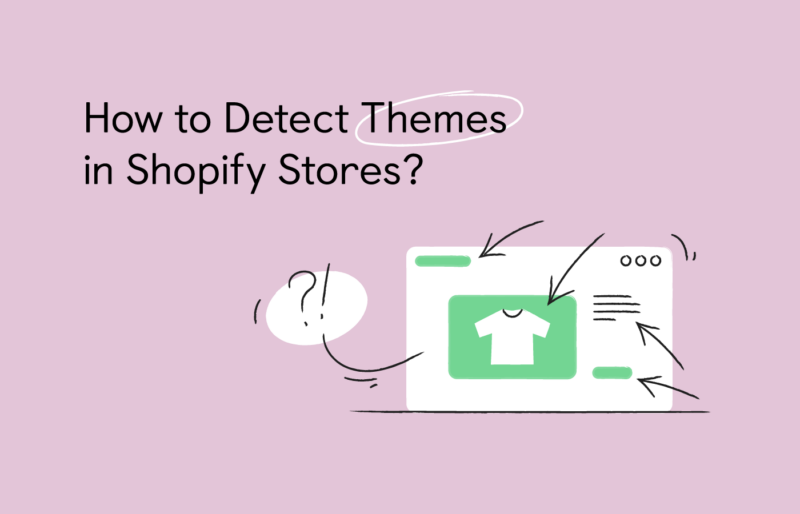Shopify, being a frontrunner in the e-commerce platform race, offers a myriad of themes to its users. These themes dictate the online store’s overall look, feel and user experience. But pinpointing a store’s exact theme isn’t always straightforward with a sea of stores out there. That’s where tools like the Shopify Theme Detector step in.
Ever browsed a Shopify store and wondered, “What Shopify theme is this website using?”. You’re certainly not alone in this. With Gochyu theme detection is made simple.
Many budding entrepreneurs and online shoppers alike often get intrigued by the design and functionality of certain Shopify stores. Thankfully, there’s a tool designed to quench that curiosity.
Why Is Identifying the Theme so Crucial?

Recognizing the theme a store uses can be pivotal for several reasons:
- Inspiration for Entrepreneurs: If you’re on the brink of setting up your own Shopify store, understanding the themes successful stores use can give you a head start.
- Competitive Analysis: For those already running a store, discerning competitors’ themes can shed light on their design and strategic choices.
- Pure Curiosity: For the casual shopper, sometimes it’s only about satisfying one’s curiosity.
How Does the Shopify Theme Detector Function?

Shopify Theme Detector is simplicity personified. Input the URL of the Shopify store you’re intrigued by, and the tool dives in, identifying the theme in use. But it doesn’t stop there.
It also offers more insights about the store, like the apps they’ve integrated. Such nuggets of information can be gold for those aiming to fine-tune their Shopify stores. Here are some of the extra insights that such tools can offer:
Apps in Use
The detector can identify which Shopify apps a store has integrated. It’s handy for competitors or new store owners who want to understand which tools and functionalities are utilized by successful stores.
Platform Version
Some detectors can identify the version of Shopify the store is running on. It can be helpful for developers or businesses looking to ensure compatibility with plugins or custom code.
Store’s Popularity
Some tools provide an estimate of the store’s popularity or ranking based on various metrics. It can show how well the store performs in its niche.
SEO Insights

The detector might offer insights into the store’s SEO practices, such as meta tags, descriptions, and other on-page SEO elements.
Mobile Responsiveness
The tool can check if the store is mobile-friendly, which is crucial in today’s mobile-first shopping environment.
Page Load Speed
Some detectors analyze the loading speed of the store’s pages. A faster-loading site provides a better user experience and can rank higher in search engine results.
Social Media Integration
The tool can identify which social media platforms the store is linked to and how they integrate social media into their website.
Security Features

Some detectors can provide insights into a store’s security features, such as SSL certificates.
Payment Gateways
The tool might identify which payment gateways and methods the store supports, giving insights into the store’s payment flexibility.
Currency and Language Options
The detector can identify the languages and currencies the store supports for global stores.
Related Stores
Some tools can even suggest similar stores on design, products, or functionalities.
At their core, Shopify Theme Detectors give a full picture of a store’s setup, features, and how it performs. This info’s gold for rivals, devs, and business folks. They can see what top Shopify stores are doing right.
The Undeniable Influence of Themes in E-commerce

Themes are the backbone of e-commerce. They dictate product display, user navigation, and the store’s aesthetic. A suitable theme can make or break a store’s success. Research by Stanford University revealed that a whopping 75% of users form judgments about a company’s credibility based on its website design, emphasizing the gravity of theme selection.
Themes play a pivotal role in the success of an e-commerce store. Their importance can be understood from various perspectives:
First Impressions Matter
The theme determines the visual appeal of a store. A good-looking theme grabs a visitor’s attention right away. They’re more likely to check out the store. It’s common knowledge that the initial encounter leaves a lasting impact.
User Experience (UX)
A good theme ensures the site is easy to navigate, products are displayed attractively, and information is accessible. A seamless UX can significantly influence a visitor’s decision to purchase.
Mobile Responsiveness
With significant online shopping done via mobile devices, e-commerce themes must be mobile-responsive. A theme that displays well on various screen sizes ensures that customers have a consistent shopping experience, regardless of the device they use.
Loading Speed

Themes optimized for speed ensure that web pages load quickly. Slow-loading sites can deter potential customers, leading to higher bounce rates and lost sales opportunities.
Branding Consistency
Themes allow businesses to align their online store’s look and feel with their brand identity. Consistent branding across all platforms builds trust and recognition among customers.
SEO Optimization
Many modern e-commerce themes come with built-in SEO features. A theme that’s optimized for search engines can improve a store’s visibility on platforms like Google, driving organic traffic to the site.
Features and Functionalities
Themes often have built-in features like product zoom, related product suggestions, and social media integration. These features enhance the shopping experience and can influence purchasing decisions.
Adaptability

The best e-commerce themes are flexible and can be customized to suit the evolving needs of a business. As an online store grows and changes, its theme should be able to adapt without requiring a complete overhaul.
Trustworthiness
A professional and polished theme can instill confidence in shoppers. A site that looks amateurish or outdated can raise red flags for potential customers, making them hesitant to enter payment information.
Conversion Rate
All these elements aim to turn visitors into buyers for an e-commerce store. Picking the right theme can ramp up sales and bring in more money.
Tips to Nail the Perfect Shopify Theme

- Understand Your Audience: If you’re targeting a predominantly male audience, like many tech or outdoor gear sites, lean towards masculine themes and color schemes.
- Don’t Compromise on Responsiveness: Your chosen theme should shine on desktop and mobile platforms.
- Match Your Product Range: Some themes excel with a vast product array, while others are tailor-made for single-product showcases.
- Flexibility is Key: Opt for themes that offer ample customization options. It ensures your store remains unique and aligns with your brand ethos.
Wrapping Up
Whether you’re starting out, have been running a store for years, or are a curious shopper, tools like the Shopify Theme Detector are super handy. With e-commerce changing so fast, keeping up and using smart data is key to winning. So, the next time a Shopify store’s theme piques your interest, you know exactly where to turn.

